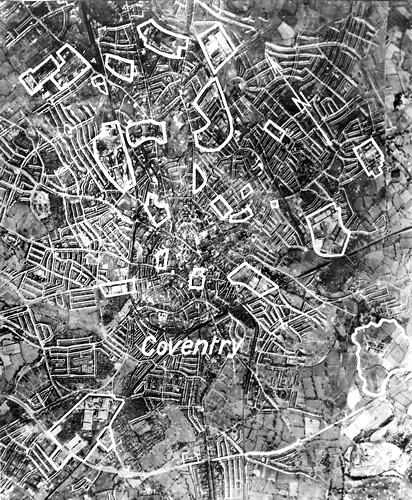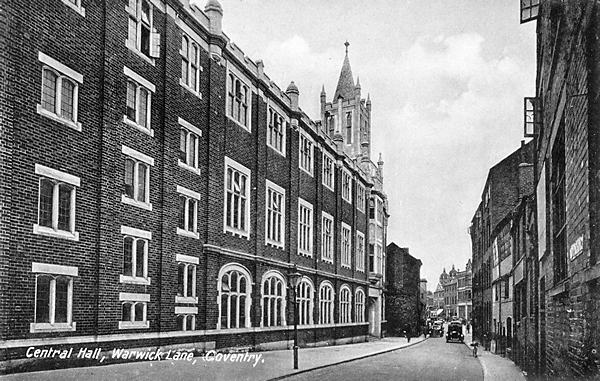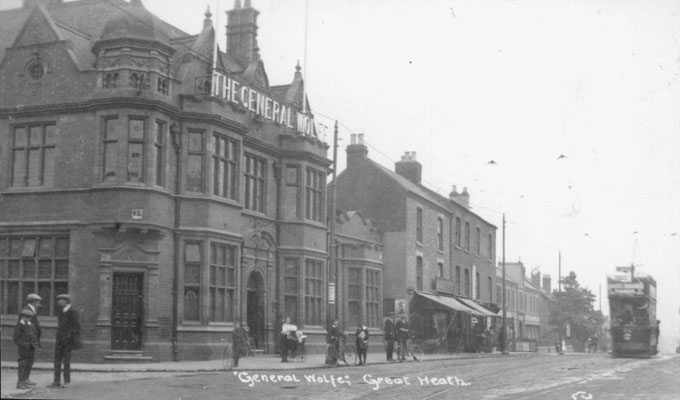|
Index...
|
 ay back in those far off days of the forties and fifties, summers were always like the one we have just had (2018) and winters were always very cold. At least, that is how people of my advanced years remember them no matter what the weather records say.
ay back in those far off days of the forties and fifties, summers were always like the one we have just had (2018) and winters were always very cold. At least, that is how people of my advanced years remember them no matter what the weather records say.

Growing up in war time Coventry for a boy was more like a long lasting adventure rather than a time to be fearful of what the Luftwaffe intended for us. Bombed out buildings were a treasure trove of finding out of the ordinary items, such as sash window lead weights that we mistook for incendiary bombs. There was also the twisted girder that partially destroyed our outside toilets, that landed there as a result of the land mine that hit Livingstone Road baths. There was also the experience of going out in the dark to the Sterling Metals air raid shelter and hearing the pom-pom guns going off. As I grew a little older, I learned that my sister had been hit on her shoulder by a piece of shrapnel from those same ant-aircraft guns when we left the shelter after the all clear had sounded. It was only in my much later life that I found out a German reconnaissance aircraft had flown over the factory to identify it as a prime target on my birthday in September 1939, just after war had been declared. In the book "Coventry at War" by Alton Douglas several German target maps are printed.
Back in the shelters, my mother told me that any illness going round was always caught by nearly all the children, especially whooping cough and measles. Part of this wonderful adventure was the joy of sleeping four in a bed; my mother and sister at the top and my brother and I at the bottom in top to tail fashion. My Dad was away in the RAF and I expect that my mother thought we would keep much warmer that way and, possibly, safer.
Later in the war, 1944, I had to go and stay with my godmother for a time in Kingfield Road since my mother had to have an operation. There I discovered a Morrison shelter, which was a heavy duty steel table that a family would shelter under during air raids. Anderson shelters were supplied to some families who had space in their gardens. While I was there I was suffering from broken chilblains on my toes and I remember Doreen, my godmother's daughter, "piggy-backing" me to and from Pridmore Road School. The only things I could get on my feet were canvas pumps. The worst part I remember was having Elastoplasts removed after I had had a bath to get them really soft and to remove the adhesive before being replaced. Miss Shortridge was my teacher and she was especially kind to me. On the other hand, my mother had to find sixteen shillings and nine pence from her meagre RAF marriage allowance to pay for her convalescence, since there was no NHS in those days. I found the bill in some of her old papers not too long ago, and it was in the name of the City Treasurer, Sidney Larkin. His son later found fame as Philip Larkin, the poet.
My usual school was Holbrooks and I don't have much to recall about the infants section, apart from remembering my first teacher, Mrs. McKnight, and a Wendy House on wheels in the hall. Going up to the juniors was great for me and the names of Mrs. Sadler and Mr. Wetherall remain fond memories as class teachers, and also Miss P. M. Robinson, the teacher who took the top class. Tom Wragge, another teacher, parked a green Lagonda in the playground and I think he came to the school after his war-time service had ended. It had a long bonnet with a leather strap over it. Thinking back, we took tests every year and took home our reports to show our position in class, marks achieved by subject and comments, and at the top it said number of absences and the number of times late.

The Head Teacher was Mr. Turland, who some people may remember as the Coventry Evening Telegraph rugby notes correspondent. Hanging on the wall in his room was a photo of Ivor Preece in his England rugby shirt and cap, and I believe he went to my school.
In 1947, Princess Elizabeth married Phillip Mountbatten and one of the hymns was the 23rd Psalm sung to the tune of Crimond, and Mr. Turland liked it that much that he taught us to sing it; not only the melody, but the descant as well. He also played gramophone records to us, and I well remember the Manchester Schools Choir singing Nymphs and Shepherds, which we had to learn, and I seem to recall we sang it at the Methodist Central Hall in a schools' competition. He also played Marche Militaire by Schubert for us as well as some Elgar, and he gave me my love of music.
In 1948, as well as the Olympics in London where the Dutch woman Fanny Bankkers Koen excelled on the track, we held our own version of the games. We putted the shot with stones and ran short races from the jetty into Park Street up to the Foleshill Road, turned left and left again down Station Street and back into the jetty. The marathon was down Station Street along Lockhurst Lane turning left at Farr and Reddy's bakers shop up Livingstone Road past the baths and again turning left into Foleshill Road before returning to our start point.
 t must have been just after the war had ended, I seem to remember being on the Foleshill Rd by the General Wolfe pub when a Jeep had stopped and I asked the question "Got any gum chum?" to the GIs. A more vivid memory of this well known landmark of Foleshill was the Sunday evening parade of the Salvation Army band who had marched from their HQ in Broad St and they stopped opposite the pub just inside Station Street East to play hymns. Perhaps they stopped there to remind the regulars of the "evil demon drink".
I think it was on Saturday evenings we went to the Sunshine Corner. This was an event the Sallies arranged for the children and if I remember rightly, it was held in a Nissen hut very close to Foleshill library in Broad St. My main memory was watching a magic lantern show and singing two songs. The first went like this:-
t must have been just after the war had ended, I seem to remember being on the Foleshill Rd by the General Wolfe pub when a Jeep had stopped and I asked the question "Got any gum chum?" to the GIs. A more vivid memory of this well known landmark of Foleshill was the Sunday evening parade of the Salvation Army band who had marched from their HQ in Broad St and they stopped opposite the pub just inside Station Street East to play hymns. Perhaps they stopped there to remind the regulars of the "evil demon drink".
I think it was on Saturday evenings we went to the Sunshine Corner. This was an event the Sallies arranged for the children and if I remember rightly, it was held in a Nissen hut very close to Foleshill library in Broad St. My main memory was watching a magic lantern show and singing two songs. The first went like this:-
Sunshine Corner, oh it's mighty fine. It's for children under ninety-nine. All are welcome, God's great love is free. Happy Sunshine Corner is the place for me.
The second was:- 1 2 3 the devil's after me, 4 5 6 he's always throwing bricks, 7 8 9 he misses every time. Alleluia, Alleluia, Amen.

Most people who lived in Foleshill used to say they were going up the Wolfe when they went shopping. There were many shops there and I remember queuing up at Harvey's for hot cross buns on Good Fridays. All the shops closed at one o'clock to mark this Holy Day. Probably the best known shop there was the Lockhurst Lane Co-Op Emporium and going up to next floor in the lift was a real treat. It also had vacuum tubes to send money to the cashier who returned it with any change and the receipt. I remember my Mum's check number was 8110 and her number for Coventry Co-Op was 45486 which I recited to Mrs. Baker, the shop assistant, after Mum had sat me on the counter and completed her purchases. One of these I remember was sugar in blue paper bags. This was at the bottom of Bishop St. From there, we walked to her niece's sweet shop near the bottom of Starley Road. However I called her Aunt Ada because she was only a few years younger than my Mum, who was the last born of nine children. She used to buy Fox's Glacier Mints, but I wasn't keen on those, and perhaps that's why Mum bought them or it might have been there was nothing else available, since they were on ration. Was it 1954 when they came off?
Going up the Wolfe had a literal meaning for me after my Dad had come home from service in the RAF. He used to give me an empty pop bottle and a shilling to go and get him a pint of mild beer from the outdoor. The barman used to put a yellow sticky label over the top so that my Dad would know if I had opened it for a quick taste. Minors could buy beer in those days provided that the bottles always had these labels attached to them. The pint of mild cost about tenpence and a pint of mixed was probably a ha'penny more. For the benefit of younger readers, mixed meant half a pint of mild mixed with half a pint of bitter. Tenpence in today's decimal currency is just over 4p, so compare that with about £4 for a pint today and there was no such thing as lager. There was stout and I think there was also Guinness.
Just along Foleshill Road, going towards town, was the Regal cinema where we had the Saturday morning rush. Tom Mix and Johnny Mack Brown were my favourite cowboys and you could tell when their films had been shown because I galloped home slapping my bottom as the substitute horse and firing an imaginary pistol at the "baddies". As I got older, I became a committee member of the ONCCC, which stands for the Odeon National Children's Cinema Club and along with others our job was to keep the queue in order. The reward for this was to get in for nothing and to sit in the balcony. Similar to the Sallies, we also had a song which started, "We come along on Saturday morning greeting everybody with a smile" and included "Good citizens when we grow up and champions of the free". The pride wearing my ONCCC arm band and having a little bit of authority was great.
Another place where we used to sing was Station St West Methodist Church where I went every Sunday morning and afternoon. When the collection was taken we would sing either Give said the little stream or Hear the pennies dropping, listen as they fall. My favourite teacher was Lucy because she always made a fuss of me. She lived with her family in a cottage that was next door to the church. I have still got one of my Sunday School prizes awarded for regular attendance during the year ending December 1944. The title is not PC now - "Black Pete" by T. H. Scott and I think it may been chosen for me because of my first name. Inside the cover is a picture of Pete tied to a stake, while a native brandishes a curved weapon in front of him. One of the school superintendents whose name appears inside was Mr. O. R. Harris and I remember he had a hardware shop on the Foleshill Rd in Little Heath.
For readers who do not know Foleshill, the General Wolfe is in Great Heath and as you reach Cross Road going down the hill towards Longford you reach the Partings (of the Heaths) and the pub on the left hand side there was called the Little Heath Hotel. If my memory serves me right, a Civic Restaurant was opened alongside it or just slightly to the rear during the war, probably for the benefit of the factory workers from Alfred Herbert Machine Tool works in Cross Road. Possibly, workers also came from the Morris Engines works at Courthouse Green and the Riley works at the top of Beresford Avenue. Today, of course, we remember Sir Alfred Herbert for the Art Gallery and Museum and his wife for Lady Herbert's Garden.
I have digressed from Sunday School days and at this time of year I remember very vividly the very large wheat-sheaf loaf and the baskets of fruit that were placed in front of the pulpit for the Harvest Festival. On the following Monday evening, an auction of the gifts was held in the church hall and my twopence was never enough to buy me anything. A memory from earlier in the year, May time, was when the Sunday School Anniversary service was held. For weeks before the actual date, we had to learn to sing special songs to celebrate the occasion for when the Mums (and sometimes a Dad) came to listen to us. Looking back, I feel sorry for the choir master, Mr. Hirons (might be Hiorns) for sometimes giggles would break out and, even worse, peals of laughter when we got it wrong. However, it was a labour of love for him. On Whit Monday, we used to have the "MARCH" when all the Sunday Schools walked behind the various church banners. Memories do fade, but I remember one that went down Stoney Stanton Road.as far as the Swanswell.
Later on, as we started to mature, we went to Sunday evening services and I am very sure it was not the religious content that attracted us and, speaking for myself, it was the young ladies and one in particular. Without naming names, she was the daughter of a Warwickshire County cricketer who when he retired opened a sports shop on Holbrooks Lane bridge. Alas, it was only puppy love. Mentioning that, during the cricket season when Warwickshire played at Courtaulds ground in Lockhurst Lane on the odd occasion, I used to rush from school to watch them play. There was no admittance charge for us after 4 o'clock and I can remember some of the players' names. Tom Dollery the captain, Fred Gardner an opening batsman, Dick Spooner, who I think was the wicket-keeper and who could forget Eric Hollies?!? Cricket fans will remember him for bowling out the great Sir Donald Bradman for a "duck" thus spoiling this Australian's batting average of a perfect 100 in his last Test Match at the Oval in London. I think it ended up as 99.99. I have only seen Eric do this on TV several times and I greatly admired him, so I tried to emulate his style of leg breaks and I am so very pleased that I saw him in action.
The county side also used to play at Coventry and North Warwickshire ground in Binley.
Finishing these boyhood memories with a Coventry Kid, do you remember Tom Cartwright, an excellent seam bowler and a good batsman who played for England many times?
Website by Rob Orland © 2002 to 2026